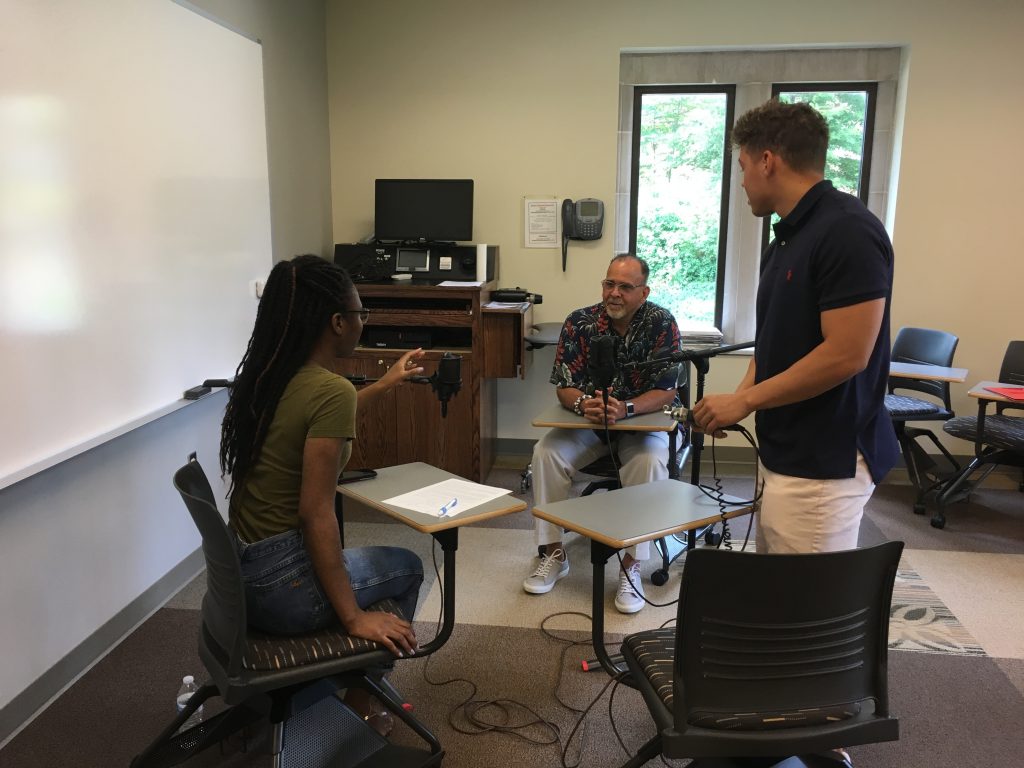[For the first blog post of the Summer 2018 A&S Research Fellowship, students were tasked with exploring the existing collection of the Race & Racism at UR Project at memory.richmond.edu and reflecting on the materials they encountered there.]
by Tucker Shelley
Tucker Shelley is a rising senior at UR from Burlington, Vermont. He is a member of the Theta Chi fraternity on campus. In his free time, Tucker prefers staying active and listening to good music. This is his first summer working on the Race & Racism Project and will continue similar work next semester for Dr. Maurantonio in the “Digital Memory and the Archive” course.
I recently just checked out the Race & Racism Project website to explore projects done by students in the class “Digital Memory and the Archive.” I also thought this was particularly intriguing for me as I am taking that course next semester and am excited to continue to pursue these projects. I took a look at a bunch of the projects, but the one that really caught my eye was the podcast called “A Campus Divided.” This is a podcast made as part of the project that addresses issues with athletes, particularly black athletes, and the social environment harbored at UR in the 1970s and 80s.
They begin the podcast by explaining that through their archival research, that the school had a community that was divided between athletes and non athletes. They cited an all star black athlete, one of the first on campus, saying that it was difficult for the university to recruit black athletes as they felt they had no place in the social life on campus. This was verified by Collegian articles from back then, but their interview with a black alum by the name of Rayford L. Harris, Jr. on his days at the university refuted those claims. He said he never felt that kind of discrimination and was actually invited to join the Lambda Chi Alpha fraternity. One cause for this might be because he was a day student and lived off campus. He could have been more distant from campus life than a residential student. I side more with the Collegian given what I have seen during my time on campus.
I knew next to nothing about the University of Richmond before arriving on campus. My Aunt recommended that I apply, as it is a prestigious liberal arts institution. I had never heard of it, as it is not very popular north of Boston, but decided to apply anyways. It was the best school I was accepted to and I fell in love with the campus on my first visit. However, since then I have learned a lot about the social structure on campus. The biggest thing I’ve noticed is that black students aren’t represented to the extent they should be. Greek organizations control the social nightlife on campus. Historically, and especially in a conservative suburb of Richmond, these are typically white organizations. These organizations, including mine (Theta Chi), often don’t allow athletes into their events. This is due to disrespect we have been shown by them with their conduct at said events. We had a couple instances in which our brothers were physically assaulted by athletes and friends they bring. Thus we thought it would be in our best interest to ban athletes from our events. However, on campus, I have realized that the words “black” and “athlete” are often synonymous, which makes the outlawing of athletes at these parties extremely problematic, as our decision regarding members’ safety is portrayed as a race issue.
Coming from Vermont, I thought this school was going to be southern, and thus have a high population of black people in the social life of the school. According to the 2010 US Census Report Richmond was 50.6% black, and I imagined the campus would reflect that demographic. It is probably safe to assume that black athletes felt the same sense of disappointment upon arrival to campus. I was excited to diversify my friend group, which I definitely did, but not as much in the sense of racial diversity as I had hoped. Listening to this podcast and hearing about challenges faced in the 1970s and 80s is discouraging to me as almost nothing has been done to alleviate this problem and it is eating away at the athletics and social life on campus.

